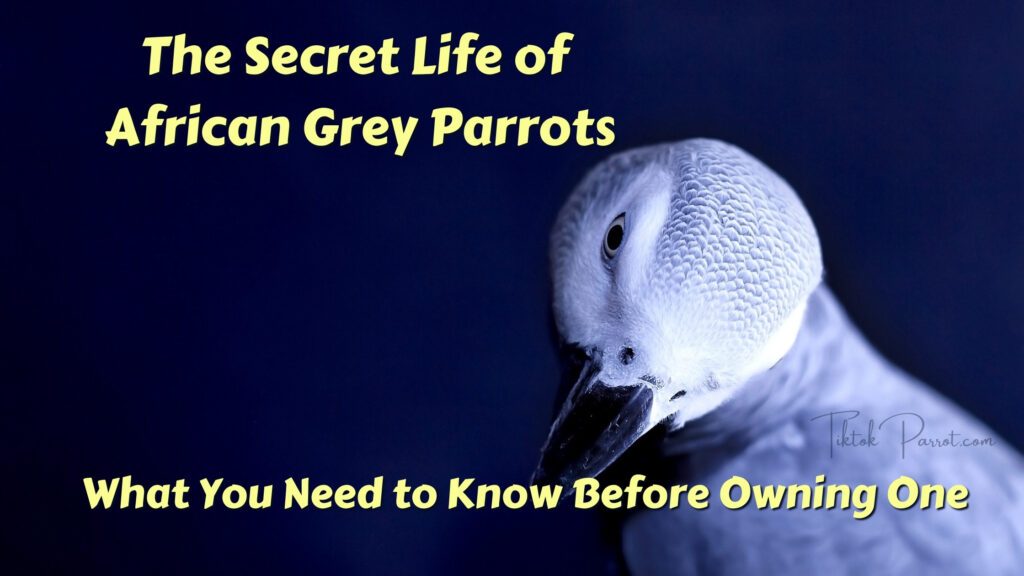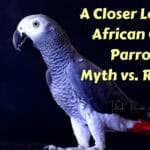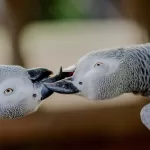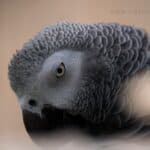African grey parrots are intelligent and social birds that have long been popular as pets. With their distinctive grey feathers and ability to mimic human speech, it’s no wonder that these birds have captured the hearts of many. However, before considering adding an African grey parrot to your family, it’s important to understand the realities of owning one of these amazing birds.
“From their long lifespan and specific care needs to their socialization requirements and legalities, get the inside scoop on the secret life of African grey parrots in our this blog post.”
“Unlocking the Mysteries of the African Grey Parrot: The Secret Life of One of the World’s Most Intelligent Birds.”
The Secret Life of African Grey Parrots
African grey parrots are known for their intelligence, ability to mimic human speech, and striking grey plumage. But there is much more to these birds than meets the eye. In this blog post, we will take a closer look at the secret life of African grey parrots, delving into their behavior, habitat, and unique characteristics that make them one of the most fascinating bird species on the planet.
African grey parrots are native to the rainforests of West and Central Africa, where they live in flocks of up to 30 birds. They are arboreal birds, meaning that they spend most of their time in the trees, and they are highly adaptable to different types of forest environments.
One of the most striking characteristics of African grey parrots is their intelligence. Studies have shown that they have cognitive abilities on par with chimpanzees and dolphins, and they are even capable of solving complex problems. They are also highly sociable birds, with a strong bond between family members and the flock.
In fact, they are considered one of the most accomplished mimics in the animal kingdom, and can learn to mimic hundreds of words and phrases. They are also capable of understanding the meaning of the words they mimic, which is a level of language comprehension that is typically seen only in humans and great apes.
In captivity, African grey parrots are known to form strong bonds with their human caretakers, and they are highly affectionate and playful birds. However, they are also known to be prone to behavioral problems, such as feather plucking, if they do not receive enough mental and physical stimulation.
Despite their popularity as pets, African grey parrots are also facing threats in the wild, due to habitat loss and illegal trapping for the pet trade. Conservation efforts are underway to protect these birds and their habitats, but more needs to be done to ensure their survival for future generations.
In conclusion, the African grey parrot is a highly intelligent, fascinating bird species with a secret life full of unique behaviors and characteristics. They are beloved by bird enthusiasts and pet owners alike, and deserve our protection and care to ensure their survival in the wild.
What You Need to Know Before Owning One
One of the most important things to know about African grey parrots is that they have a long lifespan, sometimes living for over 50 years in captivity. This means that they require a long-term commitment from their owners and should not be considered short-term or disposable pets.
In addition to their long lifespan, African grey parrots also have a range of specific care needs that must be met to ensure their well-being. They require a varied diet that includes a variety of fruits, vegetables, and a high-quality pellet or seed mix. They also need plenty of mental and physical stimulation to prevent boredom, which can lead to negative behaviors. Providing your African grey parrot with a variety of toys and enrichment activities can help to keep them entertained and engaged.
African grey parrots are also social animals that need regular interaction and socialization to thrive. They are known to bond closely with their owners and can become distressed if left alone for long periods. It’s important to provide your African grey parrot with plenty of opportunities for social interaction, whether that be through playtime, training sessions, or simply spending time together.
While African grey parrots are intelligent and can be trained to perform a wide range of behaviors and tricks, it’s important to approach training with patience and positive reinforcement. These birds can be sensitive and may not respond well to negative or punishment-based training methods.
If you’re considering adding an African grey parrot to your family, it’s important to be prepared for the long-term commitment and research the care requirements to ensure you can provide a happy and healthy home for your new feathered friend. With the right care and attention, African grey parrots can make wonderful pets for those who are willing to put in the time and effort to meet their needs.
In addition to their care and training requirements, it’s important to also consider the legalities of owning an African grey parrot. In some areas, it may be illegal to own a wild-caught African grey parrot, and it’s important to only purchase birds that have been responsibly bred in captivity. It’s also important to research and follow any local laws and regulations regarding the ownership of exotic pets.
Another important consideration when owning an African grey parrot is the noise level. These birds are known to be vocal and may make a lot of noise, especially when they are left alone or are not getting enough attention. This can be a concern for those who live in close quarters or have noise-sensitive neighbors.
It’s also important to note that African grey parrots are not the right pet for everyone. While they can be affectionate and social, they can also exhibit challenging behaviors, such as biting or screaming, if they are not getting the care and attention they need. It’s important to be prepared for the possibility of dealing with these behaviors and to seek out resources and support if needed.
Before adding an African grey parrot to your family, it’s important to do your research and understand all of the responsibilities and challenges that come with owning one of these amazing birds. While they can be a rewarding addition to the right family, they are not a decision to be taken lightly.
If you’re not sure if an African grey parrot is the right fit for your household, you may want to consider starting with a smaller or less demanding pet before making a decision.
Conclusion
In conclusion, African grey parrots are intelligent and social birds that can make wonderful pets for those who are prepared to meet their care and training needs. However, it’s important to understand the realities of owning one of these birds, including their long lifespan, specific care requirements, and socialization needs.
It’s also important to consider the legalities and noise considerations of owning an African grey parrot, as well as the possibility of dealing with challenging behaviors.
By understanding the secret life of African grey parrots and being prepared for the responsibilities and challenges of owning one, you can make an informed decision about whether these amazing birds are the right fit for your household.
If you have made your mind to have an African Grey, to begin with check out this Ultimate Guide to Care and Training Grey Parrot.
You may like to read these frequently asked questions (FAQ) about African Grey Parrots.
If you found this blog helpful, It would be great if you could share it with your family and friends who might find it useful as well.
For more useful content about African Grey parrots, you can subscribe my site with your email to get notification upon publishing a new blog, the subscribe box you can see on the right side of this page. Also if you get an alert on your web browser while browsing my site, allow it and that will also give you an alert whenever I publish a new blog. 🙂
Stay safe and much love !














